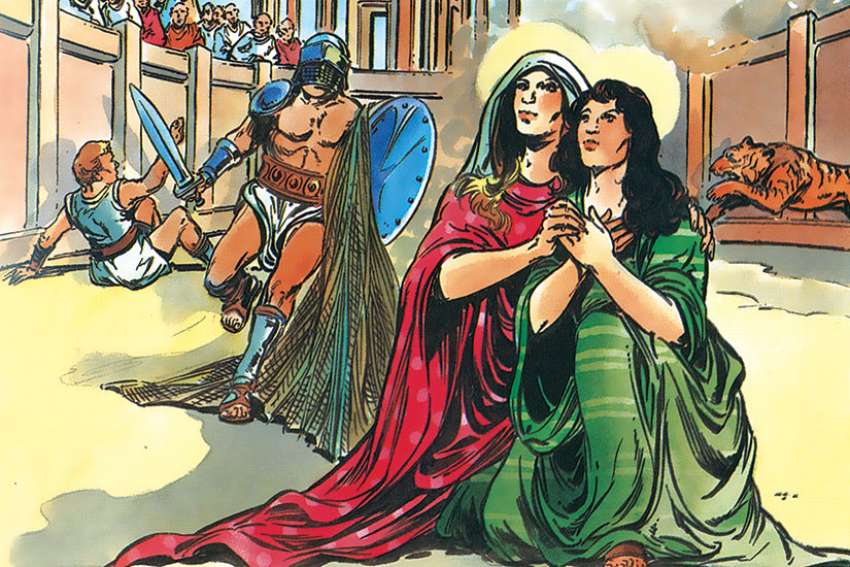First, now more than ever, the role of women in society and the Church is evolving. One need only look at the movement that ignited millions of women and men around the world to march Jan. 21 for equality. Or, look at the diverse papal panel of six women and seven men currently examining whether women should serve as deacons, as they did in early Christendom.
Second, Perpetua’s diary and first-person account of her imprisonment is historically significant. It, along with an eyewitnesses’ account of her death, is one of the oldest, most reliable histories of a martyr’s suffering.
Not only that, but it is beautifully written, filled with pathos, especially related to her father’s pain, but also joy and ebullience of a martyr at peace with her decisions.
Perpetua’s father pleaded with her to renounce Christianity to save her life and she responded: “Father, do you see this water jar, or whatever it is, standing here? Could one call it by any other name than what it is? Well, in the same way I cannot be called by any other name than what I am — a Christian.”
At the beginning of the third century, as Christianity was spreading, Roman Emperor Septimius Severus wanted everyone to believe in the Roman gods and the persecution of Christians was the law.
Perpetua, a 22-year-old new mother with an infant son at her breast, and Felicitas, an expectant mother, were arrested, along with several others in Carthage, Africa (now Tunisia), in 202, although some accounts say it was 203. Perpetua was from a wealthy family, while Felicitas was a slave. Both were catechumen, or studying to become Christians, and would be baptized in prison.
In her diary, Perpetua describes the initial horror of prison, after her baby was taken from her.
“I was terrified, as I had never before been in such a dark hole,” she writes. “What a difficult time it was! With the crowd the heat was stifling; then there was the extortion of the soldiers; and to crown all, I was tortured with worry for my baby there.”
After friends bribed the prison guards to move them to a better part of the prison, Perpetua’s baby was returned to her.
“Then I got permission for my baby to stay with me in prison. At once I recovered my health, relieved as I was of my worry and anxiety over the child. My prison had suddenly become a palace, so that I wanted to be there rather than anywhere else.”
Perpetua also describes the various visions she had while incarcerated; from a ladder leading her to Heaven to her dead brother in purgatory. Perhaps her most moving prose are the descriptions of her father begging her to change her mind and renounce her Christianity for the sake of all those who love her.
“This was the way my father spoke out of love for me, kissing my hands and throwing himself down before me. With tears in his eyes he no longer addressed me as his daughter but as a woman. I was sorry for my father’s sake, because he alone of all my kin would be unhappy to see me suffer,” she writes.
The Christians were tried and all sentenced to be thrown to wild beasts in the amphitheatre as part of national holiday celebrations.
Felicitas, who was eight months pregnant, feared she would not be executed with her friends because women with child could not be put to death. Two days before the scheduled execution, she, Perpetua and the four other Christians prayed that Felicitas would not die alone. She immediately went into labour and delivered a girl.
Guards taunted her for crying out during childbirth, not unlike how guards taunted Jesus during His suffering on the cross. “You suffer so much now — what will you do when you are tossed to the beasts?”
“What I am suffering now,” she replied, “I suffer by myself. But then another will be inside me who will suffer for me, just as I shall be suffering for Him.”
On the day of their martyrdom, Perpetua and Felicitas were stripped and covered in nets, and then tossed into the arena to be killed by wild beasts. The crowd jeered its disapproval over their nakedness and they were given tunics to wear.
They stayed close to each other as they awaited the attack. They were injured by the beasts, but not killed. Gladiators were then ordered to use their swords to end the women’s lives, Perpetua guiding the sword into her body because the man could not bring himself to do it. Their story and their faith resonates more than 1,800 years later.
(Brehl is a writer in Port Credit, Ont., and can be reached at bob@abc2.ca, or @bbrehl on Twitter.)


